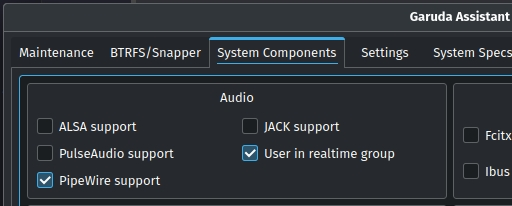I am a new Linux user, I switched to Garuda, but my audio is not working. In Fedora, Kubuntu and Windows 11, my audio used to work perfectly. However, when I switched to Garuda, there was no audio. I can still adjust volume, and stuff like that, but there is no output. One thing that I have noticed is that in Garuda, my audio is recognized as “Intel Tiger Lake”, whereas in Windows and other distributions, it used to be something along the lines of “Realtek Audio Speakers”
System:
Kernel: 6.9.3-zen1-1-zen arch: x86_64 bits: 64 compiler: gcc v: 14.1.1
clocksource: tsc avail: acpi_pm
parameters: BOOT_IMAGE=/@/boot/vmlinuz-linux-zen
root=UUID=d2738597-2b66-4933-8a4f-0453bbdcea7e rw rootflags=subvol=@
quiet loglevel=3 ibt=off
Desktop: KDE Plasma v: 6.0.5 tk: Qt v: N/A wm: kwin_wayland dm: SDDM
Distro: Garuda base: Arch Linux
Machine:
Type: Laptop System: HUAWEI product: NBD-WXX9 v: M1010 serial: <filter>
Mobo: HUAWEI model: NBD-WXX9-PCB-B3 v: M1010 serial: <filter>
part-nu: C100 uuid: 25ae741b-4fd7-4e92-ba2f-75e0f7dd22ab UEFI: HUAWEI
v: 2.31 date: 11/02/2022
Battery:
ID-1: BAT1 charge: 50.5 Wh (100.0%) condition: 50.5/54.9 Wh (91.9%)
volts: 8.6 min: 7.6 model: Sunwoda-H HB4692Z9ECW-22T type: Li-ion
serial: <filter> status: full cycles: 223
CPU:
Info: model: 11th Gen Intel Core i7-1165G7 bits: 64 type: MT MCP
arch: Tiger Lake gen: core 11 level: v4 note: check built: 2020
process: Intel 10nm family: 6 model-id: 0x8C (140) stepping: 1
microcode: 0xB6
Topology: cpus: 1x cores: 4 tpc: 2 threads: 8 smt: enabled cache:
L1: 320 KiB desc: d-4x48 KiB; i-4x32 KiB L2: 5 MiB desc: 4x1.2 MiB
L3: 12 MiB desc: 1x12 MiB
Speed (MHz): avg: 2860 high: 4372 min/max: 400/4700 base/boost: 2800/4700
scaling: driver: intel_pstate governor: powersave volts: 0.8 V
ext-clock: 100 MHz cores: 1: 1910 2: 400 3: 400 4: 4100 5: 3578 6: 4325
7: 3795 8: 4372 bogomips: 44851
Flags: avx avx2 ht lm nx pae sse sse2 sse3 sse4_1 sse4_2 ssse3 vmx
Vulnerabilities: <filter>
Graphics:
Device-1: Intel TigerLake-LP GT2 [Iris Xe Graphics] vendor: QUANTA
driver: i915 v: kernel alternate: xe arch: Gen-12.1 process: Intel 10nm
built: 2020-21 ports: active: eDP-1 empty: HDMI-A-1 bus-ID: 00:02.0
chip-ID: 8086:9a49 class-ID: 0300
Device-2: IMC Networks HD Camera driver: uvcvideo type: USB rev: 2.0
speed: 480 Mb/s lanes: 1 mode: 2.0 bus-ID: 1-6:2 chip-ID: 13d3:5476
class-ID: fe01 serial: <filter>
Display: server: X.Org v: 24.1 with: Xwayland v: 24.1.0
compositor: kwin_wayland driver: X: loaded: modesetting
alternate: fbdev,intel,vesa dri: iris gpu: i915 display-ID: :1 screens: 1
Screen-1: 0 s-res: 1920x1080 s-dpi: 96 s-size: 508x286mm (20.00x11.26")
s-diag: 583mm (22.95")
Monitor-1: eDP-1 model: BOE Display 0x0877 built: 2019 res: 1920x1080
hz: 60 dpi: 157 gamma: 1.2 size: 310x170mm (12.2x6.69") diag: 354mm (13.9")
ratio: 16:9 modes: 1920x1080
API: EGL v: 1.5 hw: drv: intel iris platforms: device: 0 drv: iris
device: 1 drv: swrast surfaceless: drv: iris x11: drv: iris
inactive: gbm,wayland
API: OpenGL v: 4.6 compat-v: 4.5 vendor: intel mesa v: 24.1.1-arch1.1
glx-v: 1.4 direct-render: yes renderer: Mesa Intel Xe Graphics (TGL GT2)
device-ID: 8086:9a49 memory: 7.53 GiB unified: yes
API: Vulkan v: 1.3.279 layers: 9 device: 0 type: integrated-gpu name: Intel
Xe Graphics (TGL GT2) driver: mesa intel v: 24.1.1-arch1.1
device-ID: 8086:9a49 surfaces: xcb,xlib device: 1 type: cpu name: llvmpipe
(LLVM 17.0.6 256 bits) driver: mesa llvmpipe v: 24.1.1-arch1.1 (LLVM
17.0.6) device-ID: 10005:0000 surfaces: xcb,xlib
Audio:
Device-1: Intel Tiger Lake-LP Smart Sound Audio vendor: QUANTA
driver: sof-audio-pci-intel-tgl alternate: snd_hda_intel, snd_soc_avs,
snd_sof_pci_intel_tgl bus-ID: 00:1f.3 chip-ID: 8086:a0c8 class-ID: 0401
API: ALSA v: k6.9.3-zen1-1-zen status: kernel-api with: aoss
type: oss-emulator tools: N/A
Server-1: PipeWire v: 1.0.7 status: n/a (root, process) with:
1: pipewire-pulse status: active 2: wireplumber status: active
3: pipewire-alsa type: plugin 4: pw-jack type: plugin
tools: pactl,pw-cat,pw-cli,wpctl
Network:
Device-1: Intel Wi-Fi 6 AX201 driver: iwlwifi v: kernel bus-ID: 00:14.3
chip-ID: 8086:a0f0 class-ID: 0280
IF: wlp0s20f3 state: up mac: <filter>
Info: services: NetworkManager, smbd, systemd-timesyncd, wpa_supplicant
Bluetooth:
Device-1: Intel AX201 Bluetooth driver: btusb v: 0.8 type: USB rev: 2.0
speed: 12 Mb/s lanes: 1 mode: 1.1 bus-ID: 1-10:4 chip-ID: 8087:0026
class-ID: e001
Report: btmgmt ID: hci0 rfk-id: 0 state: up address: <filter> bt-v: 5.2
lmp-v: 11 status: discoverable: no pairing: no class-ID: 6c010c
Drives:
Local Storage: total: 476.94 GiB used: 22.26 GiB (4.7%)
ID-1: /dev/nvme0n1 maj-min: 259:0 model: 311CD0512GB size: 476.94 GiB
block-size: physical: 512 B logical: 512 B speed: 31.6 Gb/s lanes: 4
tech: SSD serial: <filter> fw-rev: EDFOB0.7 temp: 38.9 C scheme: GPT
SMART: yes health: PASSED on: 142d 7h cycles: 1,304
read-units: 29,097,491 [14.8 TB] written-units: 28,477,185 [14.5 TB]
Partition:
ID-1: / raw-size: 476.64 GiB size: 476.64 GiB (100.00%)
used: 22.26 GiB (4.7%) fs: btrfs block-size: 4096 B dev: /dev/nvme0n1p2
maj-min: 259:2
ID-2: /boot/efi raw-size: 300 MiB size: 299.4 MiB (99.80%)
used: 584 KiB (0.2%) fs: vfat block-size: 512 B dev: /dev/nvme0n1p1
maj-min: 259:1
ID-3: /home raw-size: 476.64 GiB size: 476.64 GiB (100.00%)
used: 22.26 GiB (4.7%) fs: btrfs block-size: 4096 B dev: /dev/nvme0n1p2
maj-min: 259:2
ID-4: /var/log raw-size: 476.64 GiB size: 476.64 GiB (100.00%)
used: 22.26 GiB (4.7%) fs: btrfs block-size: 4096 B dev: /dev/nvme0n1p2
maj-min: 259:2
ID-5: /var/tmp raw-size: 476.64 GiB size: 476.64 GiB (100.00%)
used: 22.26 GiB (4.7%) fs: btrfs block-size: 4096 B dev: /dev/nvme0n1p2
maj-min: 259:2
Swap:
Kernel: swappiness: 133 (default 60) cache-pressure: 100 (default) zswap: no
ID-1: swap-1 type: zram size: 15.42 GiB used: 0 KiB (0.0%) priority: 100
comp: zstd avail: lzo,lzo-rle,lz4,lz4hc,842 max-streams: 8 dev: /dev/zram0
Sensors:
System Temperatures: cpu: 57.0 C mobo: N/A
Fan Speeds (rpm): N/A
Info:
Memory: total: 16 GiB available: 15.42 GiB used: 3.39 GiB (22.0%)
igpu: 60 MiB
Processes: 285 Power: uptime: 1m states: freeze,mem,disk suspend: s2idle
avail: deep wakeups: 0 hibernate: platform avail: shutdown, reboot,
suspend, test_resume image: 6.16 GiB services: org_kde_powerdevil,
power-profiles-daemon, upowerd Init: systemd v: 255 default: graphical
tool: systemctl
Packages: pm: pacman pkgs: 1904 libs: 569 tools: octopi,paru Compilers:
clang: 17.0.6 gcc: 14.1.1 Shell: garuda-inxi (sudo) default: Bash v: 5.2.26
running-in: konsole inxi: 3.3.34
Garuda (2.6.26-1):
System install date: 2024-06-09
Last full system update: 2024-06-09
Is partially upgraded: No
Relevant software: snapper NetworkManager dracut
Windows dual boot: No/Undetected
Failed units:


